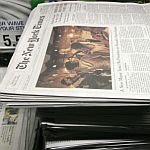 (HOST) This morning, commentator David Moats joins the growing chorus of concern about the decline of the nation’s newspapers.
(HOST) This morning, commentator David Moats joins the growing chorus of concern about the decline of the nation’s newspapers.
(MOATS) A dog in a silver casket. A tugboat pulling a freighter across the bay. A hush falling over the crowd at the Top of the Mark as the sun sets over the Pacific. These are details by a legendary columnist, now deceased, who captured the spirit of San Francisco by turning the dross of everyday life into the gold of sentiment and celebration. He was Herb Caen, and I grew up reading his columns in the San Francisco Chronicle.
As newspapers have begun to shut down across the country – in Seattle, in Denver, maybe even in San Francisco – I’ve thought about Herb Caen and what a newspapers means to a place.
This isn’t merely academic for me. I have worked for newspapers in Vermont for 33 years. I’ve written about the issues, of course, but I’ve also done my share of sentiment and celebration – of spring, summer, autumn – even winter, I suppose. I’ve covered three train wrecks. I talked to the man who buried Robert Frost’s ashes in Old Bennington. It’s part of my job and the job of my colleagues to reflect the community back to itself, to tell stories of the people, of life – its weirdness, glories and contradictions.
The economics of newspapers are now under strain, partly because of the recession, but also because of the Internet. I’m not the one to figure out the economics, except to observe that people who get their news for free may be less inclined to pay for it.
Now, with newspapers struggling, it’s worth imagining: What if there were no newspapers? Where would people get the news? From blogs? From Internet sites? Where do bloggers get their news? Where does Jon Stewart get his news? From CNN? Where does CNN get the news?
The newspapers are the ones doing most of the in-depth original research. If there were no newspapers, somebody would have to invent them, if they could pay for them.
It matters to a community that people can say, "Did you see what was in the paper?" They might not like what they see, but if it’s a good paper it’s telling an important story.
Without a paper, people would say, "Did you see what was on Blogmaniac.com?" The answer would be, "No, I don’t go to that site."
A paper is a physical thing, on the counter at the coffee shop, on the doorstep in the morning. It’s a physical part of a physical community, where actual people actually live. A newspaper is something a community shares, which seems like a valuable and ever rarer thing.
I don’t know how the economics are going to work out. The paper where I work is doing okay. But I don’t think newspapers are going away.
As for the dog in the silver casket, it was a poodle that belonged to a bereaved owner named Amadeus G. Langenberger, who buried it one night in a park. The cops caught him but then kept it a secret for 25 years – till Herb Caen told the story. And then everybody read about it